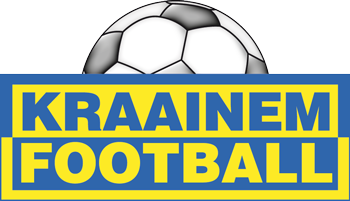Inclusiveness in football: from the theory to the practical via Kraainem
The student discovered that the notion of « adaptive » sports extends to quite a bit further than just the realm of parasports. Indeed, it is a method of practicing sports in an entirely inclusive fashion, under any circumstance and for all types of participants, notably for migrants who face considerable challenges.
It doesn’t come as much of surprise then to see Valentine land at Kraainem Football Club to observe and be inspired by their « We Welcome Young Refugees » project. Every week, on Tuesdays and Thursdays, she takes part in the conversation tables, which bring the young refugees staying at the Fedasil Centre in Woluwé-Saint-Pierre, alongside the volunteers, Myriam, Alban and Jean-François. Valentine truly loves the moments where she can share her own culture, learn new words, discover tasty recipes and leave the club with plenty of joyful anecdotes.
After this hour-long cultural exchange, Valentine accompanies the young refugees to the pitch. It is here that they join a training session and Valentine helps them to understand and properly execute the exercises given by the coaches.
Breaking down barriers on the pitch
Her observations are precious. She notices for example that the necessary amount of time required for a good presentation is not always a given. If this is the case, the names of the players (of Afghan, Eritrean, Iraqi origin to cite a few) are not remembered easily by the club’s affiliated members, who then simply end up calling them “the refugees”. As teammates must often call each other out by name on the pitch, this creates barriers as well as hindering contact between each other. Valentine suggests to the coach to favour mixed exercises to facilitate more personal instances of contacts between the players.
Among the refugees, the relationship towards football varies quite significantly. Some have never really played (the Afghans, for example, are generally more familiar with cricket). Others are probably more used to playing football in the streets rather than on a pitch : « I can guess this since they quickly find themselves being offside or they advance in the midfield and run all over the place, which tires them out too much », Valentine specifies. She does remember however two Ivorian boys and a few other characters who « knew how to place themselves very well, how to dribble, how to pass correctly ».
Managing cultural and linguistic differences requires flexibility and patience on the pitch. One needs to know how to explain things through a lot of signs and gestures, which are often applied repeatedly. Some coaches take the time to do so spontaneously, others don’t think about it as much, especially on Fridays, when the highly anticipated weekend game approaches.
Sadly, this is a match where the refugee players from Fedasil Woluwé-Saint-Pierre may not participate in. Indeed, the residents of this centre only stay for a few weeks after their arrival in Belgium. They are then sent to other reception centres, sometimes even in other provinces.
Dream big!
Valentine dreams of a broader sporting network which could maintain this support everywhere else. Which would mean that when they’d change centres, the refugee candidates could easily find other spaces to be able to practice sports. Not only in football clubs but also in places where they could practice activities such as climbing, pétanque, archery and forms of dance. « Why not ? », exclaims Valentine enthusiastically. In her home region of Annecy, some of the locals living in the mountains even organize entry-level skiing lessons for the refugees there.
Today, Valentine has graduated and is working for the Gym SANA association, which organizes physical activities for diverse groups of people (the elderly, the mentally handicapped or those weakened by a chronic illness). As passionate about football as ever, she dreams of coaching a team of refugee women and accompany them to the Olympics.







